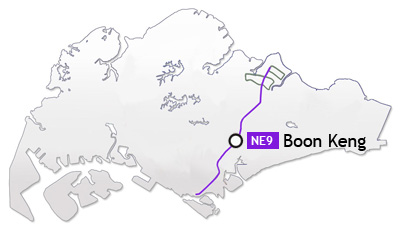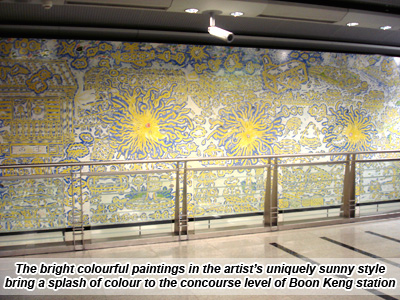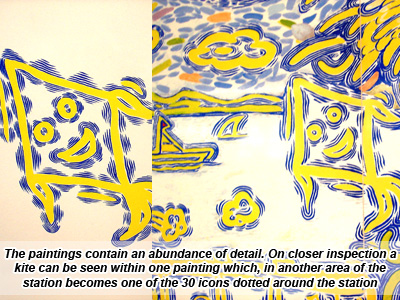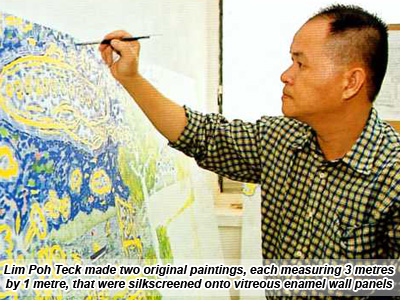|

Boon Keng station

Boon Keng station is
poised to rejuvenate the mature Boon Keng HDB estate. The
two-level underground station is integrated with
the existing HDB blocks, offering
convenience and easy access to residents and visitors to the
area.
The station's three
entrances will allow commuters to get to Serangoon Road,
Towner Road and Boon Keng Road easily. Designed
to give the station a distinctive and
open look, each entrance is carefully designed to link with
neighbouring bus stops and adjacent buildings.
In conceptualising his
work for Boon Keng station, Lim Poh Teck filled page after
page with drawings of people and places around
Boon Keng. It wasn't difficult for
him to imagine what life in Boon Keng was like in the past
as he once lived there.
The artist's extensive
research is evident in "Metamorphosis", two paintings that
depict the changes in Boon Keng estate over the
years. The acrylic paintings are
reproduced in silkscreen on vitreous enamel panels and
located in the concourse paid area of the station.

Back To Top
In the first two
paintings, Poh Teck revisits Boon Keng's past by creating
scenes from life in the area, complete with the boats,
trams and the fishermen of
yesteryear. In the second painting, he captures Boon Keng as
it is today, with the hectic pace of living represented by
the likes of high-rise flats and jet
planes.
Taking to heart the LTA's
call to embrace the station's spaces, the artist found a
clever way to make his works come alive beyond
his canvas, or the station's enamel
panels. Elements and symbols from the two large paintings
have been extracted and reproduced throughout the station
and its subways. These simple yet delightful
images are placed at a height where they can be enjoyed by
the young and young at heart.
He tried to inject some
humour and fun into his work as he likes commuters to enjoy
his work without too much effort on their
part. Some people may enjoy the
paintings then look for the icons around the station. Others
may be drawn to an icon - a double-decker bus or a cat or a
space ship and discover the paintings
later.

Back To Top
With its bright, happy
colours and busy collection of images, "Metamorphosis" is
very much a work in the artist's distinctively
sunny style.
For his original concept,
the artist drew 200 icons which were eventually whittled
down to 80 and finally the 30 that have been
used in the final artwork of the
station.
There was another aspect
of his work that Lim Poh Teck needed to work through - his
handling of colour. Each of the icons had
their own shape and thus it was
important to use colour to link up the images. If the
intensity of colour was wrong, the effect of the artwork
would be lost, and if there was too much colour, the work
would not have a focal point.

Back To Top
Poh Teck's works were
fabricated at a vitreous enamel factory in Belgium, which
the artist visited together with the LTA team. The
Belgian factory tried various ways
and means to achieve as close a match as possible to the
vivid colours in the artist's original works. The method it
eventually used during colour separation was an
11-colour silkscreening process, rather than the usual
four-colour process. However, some of the nuances in the
colours, textures and details of his originals in
acrylic on canvas were lost in the process of translation.
Looking back on his
experience at Boon Keng station, Lim Poh Teck feels that
balancing his personal style with the requirements
of integrated art has taken him to a
new place in his artistic journey.
Artist:
Lim Poh Teck
Born: Singapore, 1963
Education:
- Advanced Diploma, 1989
LASALLE-SIA College of the Arts, Singapore
- Master of Arts, 1995
College of Fine Arts, School of Media Art, University
of New South Wales,
Australia
next: Potong Pasir station
Back To Top
|